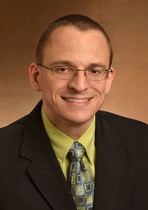 CEE is pleased to announce that assistant professor Tim Truster is the recipient of the National Science Foundation CAREER Award for his research to use computational approaches to understand locations where fatigue cracking may occur. The goal of this research is to reduce the uncertainty of why cracks form where they do.
CEE is pleased to announce that assistant professor Tim Truster is the recipient of the National Science Foundation CAREER Award for his research to use computational approaches to understand locations where fatigue cracking may occur. The goal of this research is to reduce the uncertainty of why cracks form where they do.
The purpose of this prestigious NSF program is to support the career development of select, outstanding faculty by facilitating the integration of the faculty member’s educational and research plans in the early stages of their careers.
“Receiving this CAREER award is a great honor, and I am very grateful for my students’ programming and research to produce preliminary results for these ideas,” says Truster. “I am encouraged that others researchers see the need for studying material’s fatigue behavior and developing new computational methods to target interactions at interfaces.”
Central to the research process is Truster’s integration of multi-resolution computational solid mechanics. This research directly aligns with the overarching goal of the national Materials Genome Initiative (MGI) to cut in half both the lead time and cost for developing advanced materials through the Integrated Computational Materials Engineering (ICME) approach, in particular by enabling tailored microstructure design with sizable increase in fatigue threshold resistance.
“Tim is seeking to improve our understanding of fatigue at the micron scale. This is a very fundamental problem with enormous practical applications ranging from bridges, to oil rigs, to aircraft. His research will contribute to changing the way we develop new materials that are less prone to fatigue.”
Truster’s research is vital to the understanding the problem of fatigue and new computational approaches to understand at the mesoscale how forces are transmitted. In tandem, the educational components of the project involve curriculum enhancements for vectors education and computational mechanics to directly impact courses at the 11th grade up to graduate level, and broader impact is achieved through teaching new pedagogies to educators.